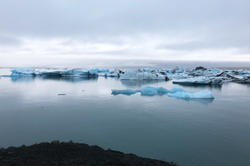Nine students and recent graduates are working virtually to bring the benefits of art and design to nonprofits around the world.
Maharam Fellowships Support Greater Good

“I grew a vat of the bacterium Violacein, added textiles to the dye bath, put it on heat and came back a few days later to beautiful, rich blue and purple hues,” says alumna Kate Reed BRDD 21 ID. An artist-in-residence at biotech-focused BosLab in Cambridge, MA, Reed is one of 10 RISD students and recent alums working this summer as Maharam fellows.
The program, which is funded by NYC textiles manufacturer Maharam, began in 2012 with a focus on nonprofits and government agencies interested in exploring the impact of STEAM (science, technology, engineering, art and mathematics). “But the program pivoted this year to focus on social justice and sustainability, in line with RISD’s strategic plan,” explains RISD Careers Director Kevin Jankowski 88 IL. “And the 10 fellows who were awarded funding are doing important and stellar work.”

Among the summer fellows striving “to advance social progress or to safeguard the environment” are industrial designers Kaanchi Chopra 21 ID, Jason Hebert MID 22, Vrinda Mathur MID 22, Reed, Juliana Soltys MID 22 and Avantika Velho 21 ID.
Chopra is creating compelling visual content for Rhode Island-based nonprofit Remake to educate the public about the evils of fast fashion. “Fast fashion is synonymous with forced and child labor,” she explains, “and it puts the ecology at risk throughout all steps of the supply chain.”
“Fast fashion is synonymous with forced and child labor, and it puts the ecology at risk throughout all steps of the supply chain.”
Grad students Hebert and Soltys are working together as design education coordinators in the Green Team Youth Program at Groundwork Rhode Island. The program teaches underserved youth of color in redlined Providence neighborhoods about the history of their communities and how to make small but impactful improvements at the grassroots level. “I’m hoping to gain a clearer understanding of how socially oriented, bottom-up initiatives overlap with design,” says Hebert. And Soltys adds that “the goal is to increase the youths’ sense of agency and autonomy.”

Mathur is also focused on community empowerment, but through the lens of our changing climate. Working with the nonprofit Social Enterprise Greenhouse in Providence, she is amplifying systemic inequities that continue to plague climate action policies related to water, energy and food systems.
Meanwhile, Velho is using her passion for designing sustainable, accessible and regenerative future technologies by conducting bioremediation research at the Living Systems Laboratory in South Grafton, MA. “I’m hoping to design a more interactive lab experience that connects observers to the invisible natural systems they might encounter,” she says.
“I’m hoping to design a more interactive lab experience that connects observers to the invisible natural systems they might encounter.”
Architecture students Shreya Kaipa BArch 23 and Leslie Ponce-Díaz BArch 23 are working, respectively, in the realms of food systems and education, Kaipa in Providence and Ponce-Díaz in her hometown of Kansas City, KS. Ponce-Díaz aims to raise awareness of gun violence as a fellow supporting the Enough Is Enough initiative introduced last year by the Kansas City Public School District. And Kaipa is collaborating with the Sankofa Food and Cultural Initiative, which provides African immigrants with community garden spaces and a farmers’ market, to “create additional opportunities for people living in food deserts to grow their own culturally significant produce.”

Also focused on food systems—and how climate change is affecting them—alumna Jasmine Gutbrod 20 FD/MA 21 is collaborating with Rhode Island-based nonprofit Eating with the Ecosystem. She intends to build off the organization’s research on climate-resilient supply chains by developing community-centered educational materials about sustainable and equitable seafood consumption. “I see art and design as valuable tools for community building and empowerment, and innovative education as a pathway for those tools,” she says.
“I see art and design as valuable tools for community building and empowerment, and innovative education as a pathway for those tools.”
And finally, grad student Zibby Jahns MFA 22 SC is furthering her interest in social justice working with UK-based nonprofit Transform Drug Policy Foundation, an organization responding to the catastrophic effects current drug policies have on communities. As she explains, her goal there is to “create a collection of images corresponding to Transform’s literature to make their briefings and research more accessible to a broader population and to expose some of the stigmas and misconceptions associated with drug use.”
“What all of the fellows have in common is a true passion for using their creativity to effect positive change in the world,” Jankowski notes. “That has been the connecting thread since the Maharam Fellowship program was launched nearly 10 years ago.”
—Simone Solondz
July 19, 2021


